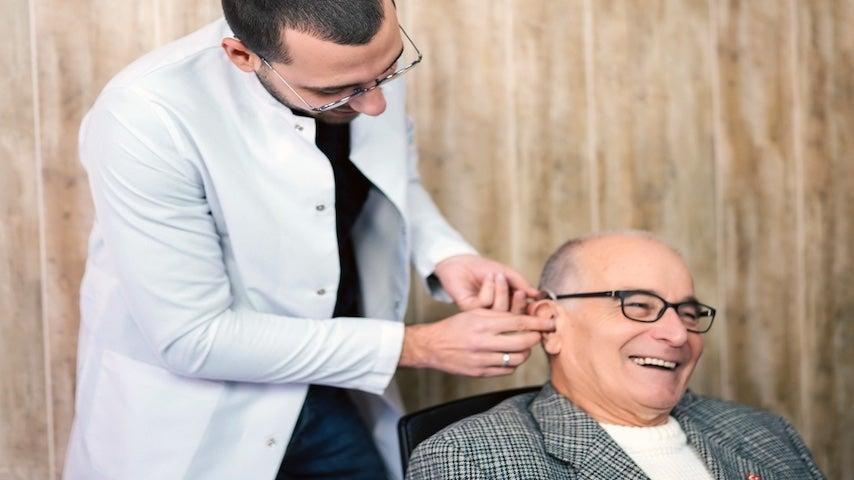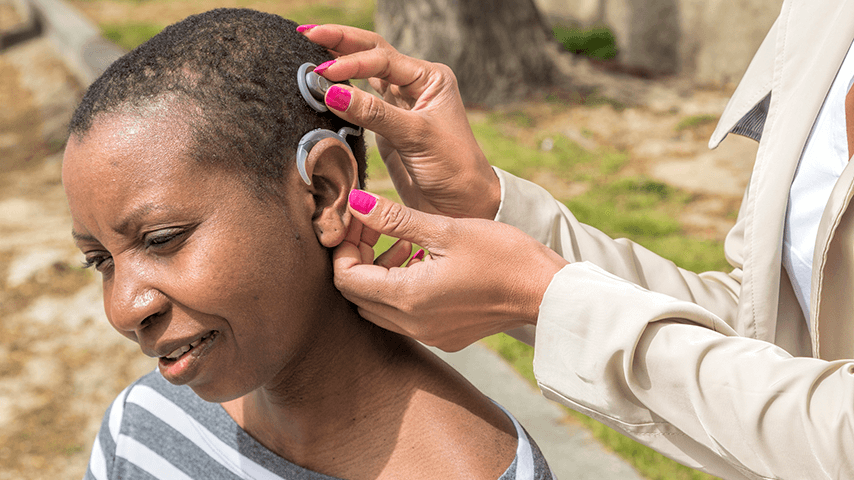
Related Topics
Have you noticed a change in the hearing of someone you care about?
Maybe they’re starting to turn the TV up higher. Or asking you to repeat yourself more. Or maybe you notice they’re beginning to withdraw from conversations and social settings. These are all common symptoms of hearing loss.1
If you’re experiencing this, you’re not alone. Hearing loss is common—one in three U.S. adults has some degree of hearing loss, and that number jumps to almost half of adults age 75+.
While it’s common, no one should have to live with untreated hearing loss. Waiting to treat your hearing loss can lead to balance problems, depression,2 and even dementia.3
With so much at stake, the importance of minding your hearing health is clear. Keep reading for help spotting the early signs of hearing loss and tips for talking about it with friends, family, or people in your care.
Recognizing the signs of hearing loss
Signs of hearing loss can be subtle, so be sure to pay attention if you notice any of the following common symptoms of hearing loss:4
- Speech and other noises are muffled
- Trouble understanding words, especially in crowds or noisy places
- Difficulty hearing consonants
- Often asking others to speak more slowly, clearly, and loudly
- Needing to turn up the volume of the television or radio
- Staying clear of some social settings
- Being bothered by background noise
- Ringing in the ears, known as tinnitus
If you notice any of these signs, don’t wait. Although on average people wait 10 years to get help with hearing loss,5 seeing an audiologist at the first sign of your hearing loss can potentially slow cognitive decline and dementia.6 The earlier you spot hearing loss, the sooner you can get help.
Understanding the emotional impact of hearing loss
Hearing loss can be a personal, emotional topic. For all of us—especially older adults—hearing loss can damage our mental health.
People who don’t hear well may feel shame, awkwardness, and weakness over not being able to keep up with the conversation. And people may reject wearing hearing aids for the following fears:7
- Aging/getting old
- Having a problem/shortcoming/disability
- Being seen as less than normal/different from others
For some people, using hearing aids is admitting they are getting older. For others, using hearing aids means facing that their body is going through age-related changes.
Even though it may be uncomfortable to confront, treating your hearing loss can help keep your self-esteem high and your social calendar full.8 Untreated hearing loss is linked to difficulty communicating, frustration, and embarrassment, which can lead to social isolation and loneliness.
Tips for how to talk to someone about hearing loss
We know it’s important to spot hearing loss and its symptoms—now let’s discuss ways to bring up the topic with a friend, family member, or someone in your care.
It can be hard to have this conversation, especially if you’re having it with a parent or someone who is not used to taking your advice.
Before you start, pick the right time and setting for a sensitive conversation. In a private place when you’re not in a rush is best.
Also, give some thought to your intentions and desired outcome. Be prepared for resistance. But don’t let that deter you or make you emotional. Remember to be calm and empathetic.
Starting the conversation
Now it’s time to start the conversation.9
Begin a dialogue by using “I” or “we” statements and sticking to facts. You can say something like, “I’ve noticed that when we talk on the phone you don’t always understand what I say,” and ask them if they’ve noticed something similar.
Jessica Galatioto, AuD, an audiologist at Columbia University’s Irving Medical Center in New York City, recommends also focusing on the benefits of hearing aids.
“Focus on specific areas where they have voiced difficulty or frustration,” Galatioto said. “Often wanting to improve specific things [like difficulty hearing grandchildren] can open the door and make people willing to try hearing aids.”
You can also bring up the idea of a hearing loss quiz, so there is a more objective way to decide if help is needed. You can say something like, “I’ve noticed that you’ve been asking me to repeat myself more often, which can be a sign of hearing loss. Do you want to take this hearing loss quiz together to see if we need help?” Taking the quiz together may make them more likely to participate. But they may need time to warm up to the idea. If that’s the case, leave the quiz with them and check back in a few days.
No matter how you start the conversation, be patient and listen actively. Don’t just wait for them to finish their thought so you can make your next point—really listen to what they have to say.
Tips for communicating with someone who has hearing loss
When speaking with someone who has hearing loss, keep these tips in mind:
- Try and get the person’s attention before speaking
- Face them directly so they have a clear view of your face and mouth
- Speak clearly, but don’t yell
- Be patient and respectful
- Repeat or rephrase as needed
Being supportive and encouraging
Because hearing loss is an emotional topic, it’s important to stay supportive and encouraging. Don’t get frustrated or upset if they aren’t receptive to your message at first. It may take time.
People can feel embarrassed or discouraged by losing their hearing and may need time to adjust to the idea that others noticed their hearing problems. Support their feelings. Don’t minimize the difficulty of confronting hearing loss.
Give them time to accept this idea, but try to frame it in a positive light. You’re here to help if they need it, and it’s something you can navigate together.
Encouraging professional help
If they’re still reluctant, consider going with them to an audiologist appointment or getting a hearing test together.
It may help to emphasize that hearing health is just another aspect of overall health and wellness, and there’s nothing embarrassing about prioritizing your health.
If they’ve never had a hearing test before, get one in-person with a hearing professional first before taking an online hearing test. Online hearing tests aren’t diagnostic, meaning they can’t diagnose the cause of your hearing loss. An in-person hearing assessment done by a hearing professional can pinpoint the cause of your hearing loss and identify issues that hearing aids can’t fix, like impacted ear wax.
“Hearing is as important to overall health as vision or heart health, and having regular checks is part of taking care of yourself,” said Ross Cushing, AuD, an audiologist and CEO of Live Better Hearing + Balance in Maryland. “Even if their hearing is still okay, a baseline test can help monitor changes over time. For someone reluctant to consider hearing aids, this is a very easy, no-pressure way to start addressing the issue.”
Hearing loss resources and next steps
Hearing loss is common, and you are not alone. For more information on dealing with hearing loss:
- Hearing Loss Association of America
- National Institute on Deafness and Other Communication Disorders
- American Speech-Language-Hearing Association
- American Tinnitus Association
- Hearing Aid Project
- Hearing Charities of America
- Miracle-Ear Foundation
If you’re getting a hearing test, be prepared to sit in a sound-proof room wearing headphones. Your audiologist will deliver sounds, and you react when you can hear them.
After the test, you’ll receive an audiogram (the visual results of your hearing test), which gauges the level of your hearing loss. From there, your audiologist will discuss hearing aid options for your specific degree of hearing loss. If your degree of hearing loss is mild to moderate, you may be able to use over-the-counter hearing aids.
Frequently Asked Questions (FAQ)
How do you encourage someone to get a hearing test?
It can be hard to encourage someone to get a hearing test. Many people might get defensive or feel insulted that you suggested they needed one. If someone you know might have hearing loss and feels reluctant to get tested, the best thing you can do is simply be supportive and available to them if they want to talk. Sometimes, introducing them to someone with hearing aids can help them feel more comfortable. But it’s important not to push, and to help them when they are ready.
What level of hearing loss requires a hearing aid?
Moderate hearing loss, which means that you have difficulty hearing or understanding conversations in a public place, is the minimum diagnosis that usually requires a hearing aid. But any level of hearing loss that makes it hard for you to participate in your daily life means it’s appropriate for you to talk to your doctor about hearing aids. You don’t need to wait until it’s “bad enough” to justify aids.
Does hearing loss affect balance?
Yes, hearing loss can affect balance. Your brain uses your ability to hear to help coordinate movement and map out its spatial awareness. Hearing loss reduces your bran’s ability to hear and process important sounds, which then makes it harder for you to maintain your balance because your brain doesn’t know the correct way to move.
Why do people avoid hearing aids?
People avoid hearing aids for lots of different personal reasons. Some don’t like the way they fit or sound, and others don’t like looking or feeling like something is ‘wrong’ with them. Some people think that needing hearing aids means they are ‘old’ or ‘frail.’ But people of all ages can experience hearing loss, and hearing aids can help improve quality of life and help reduce your chances of worse hearing in the future.
Sources
1. Hearing Loss Association of America. Symptoms of Hearing Loss. Found on the internet at https://www.hearingloss.org/understanding-hearing-loss/symptoms/
2. American Academy of Audiology. Depression and Hearing Loss. Found on the internet at https://www.audiology.org/consumers-and-patients/hearing-and-balance/depression-and-hearing-loss/
3. Livingston G, et al. Dementia prevention, intervention, and care: 2024 report of the Lancet standing Commission. The Lancet. Aug. 10, 2024. Found on the internet at https://www.thelancet.com/journals/lancet/article/PIIS0140-6736(24)01296-0/abstract
4. Mayo Clinic. Hearing Loss. March 30, 2023. Found on the internet at https://www.mayoclinic.org/diseases-conditions/hearing-loss/symptoms-causes/syc-20373072
5. Johns Hopkins Medicine. The Hidden Risks of Hearing Loss. Found on the internet at https://www.hopkinsmedicine.org/health/wellness-and-prevention/the-hidden-risks-of-hearing-loss
6. National Institutes of Health. Hearing Aids Slow Cognitive Decline in People at High Risk. Aug. 8, 2023. Found on the internet at https://www.nih.gov/news-events/nih-research-matters/hearing-aids-slow-cognitive-decline-people-high-risk
7. Nickbakht M, et al. The experience of stigma related to hearing loss and hearing aids: perspectives of adults with hearing loss, their families, and hearing care professionals. International Journal of Audiology. June 2, 2024. Found on the internet at https://www.tandfonline.com/doi/full/10.1080/14992027.2024.2353862?src=exp-la#abstract
8. Shukla A, et al. Hearing Loss, Loneliness, and Social Isolation: A Systematic Review. Otolaryngology—Head and Neck Surgery. March 10, 2020. Found on the internet at https://pmc.ncbi.nlm.nih.gov/articles/PMC8292986/
9. Johns Hopkins Medicine. Caregiver Guidance: Resisting Help for Hearing Loss. Found on the internet at https://www.hopkinsmedicine.org/health/conditions-and-diseases/hearing-loss/caregiver-guidance-resisting-help-for-hearing-loss




